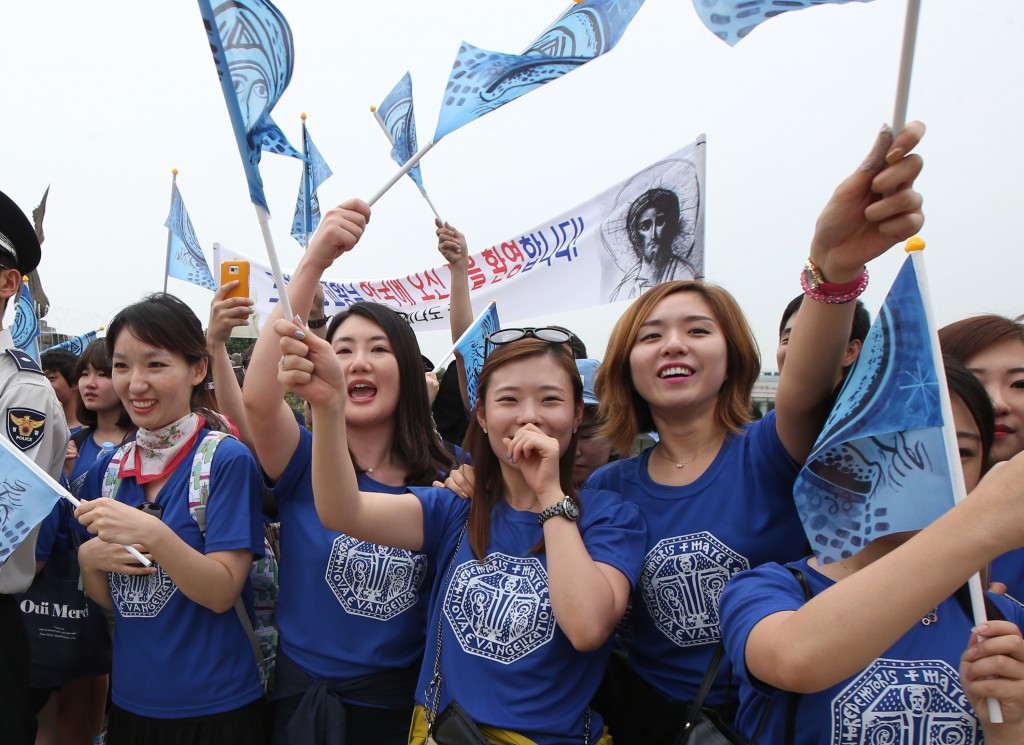- California Assembly OKs highest minimum wage in nation
- S. Korea unveils first graphic cigarette warnings
- US joins with South Korea, Japan in bid to deter North Korea
- LPGA golfer Chun In-gee finally back in action
- S. Korea won’t be top seed in final World Cup qualification round
- US men’s soccer misses 2nd straight Olympics
- US back on track in qualifying with 4-0 win over Guatemala
- High-intensity workout injuries spawn cottage industry
- CDC expands range of Zika mosquitoes into parts of Northeast
- Who knew? ‘The Walking Dead’ is helping families connect
Pope Francis’ first Asia trip to spark Catholic boom
By Baek Byung-yeul
SEOUL — Catholicism is the third largest religion here with about 5.44 million believers, following Buddhism and Christianity, according to the data from the Catholic Bishops’ Conference of Korea (CBCK). It accounts some 10.4 percent of the total population.
In fewer than 50 years, Catholics have gone from just one percent of the population to more than 10 percent today. Authorities expect it might reach 20 percent of the population by 2020.
Lee Young-sik, CBCK’s media team leader said that “it is expected that the number of Catholics could be increased after the papal visit,” though he added a rapid increase of number of Roman Catholics here won’t be visible soon.
“It is true that number of Catholics here has been increased by two percent year by year, but it would take longer to see the ‘Pope effect’ as it takes approximately six months for newcomers to be baptized,” Lee said. “Therefore, it will take more time to see the exact increasing trend statistically.”
Lee also emphasized that the steady increase of Catholics in Korea “could be accomplished not only by several public figures.”
“Without the effort from the entire Catholic circle here for inspiring confidence to this religion, it could be fewer than now,” Lee added.
Park Il-hoon, 32-year-old Catholic living in Yongin, Gyeonggi Province, said he expects that the number of Catholics will increase after the Holy Father’s visit.
“He is very popular in Korea and many people love him whether they are Catholic or not. I am so sure that his visit will inspire more people to believe Catholicism,” Park said. The country, which has the fifth-largest Catholic population among Asian countries, had already seen exponential growth after the then-Pope John Paul II’s visit in 1984 and 1989.
Steady expansion
According to Statistics Korea, Korea’s Catholics were only about 1.86 million in 1985, but by 1995 had grown to an estimated 2.95 million.
During that same period, the number of Christians increased only by two million from 6.5 million in 1985 to 8.7 million in 2005.
Expansion is not a priority for Korea’s Catholic Church during the papal visit. Local organizers of Pope Francis’ first Asia outing have placed the utmost importance on encouraging the public to listen to the pontiff’s key messages of peace and social justice.
“A growth in the number of Catholic followers would be a positive outcome of the apostolic voyage,” said Bishop Yoo Gyeong-chon in a press conference at the Myeongdong Cathedral last week. “But we are not focusing on that.”
Although not a dominantly Catholic country like the Philippines, Korea is one of the few Asian countries that has seen significant growth in the number of believers in recent years.
The nation’s Catholic population has increased its membership by 70 percent in the past 10 years. In 2005, almost 30 percent of Koreans identified themselves as Christian. Most are Protestants, but Catholics are the fastest growing group with around 5.3 million followers.
The combined Catholic Church in the two Koreas has the fourth largest number of saints in the Catholic Church since 1984 as categorized by nation.
Francis has been hugely popular throughout the world thanks to his humble leadership and active communication unlike his predecessors who were less approachable.
Following in the footsteps of John Paul II, who visited twice here in 1984 and 1989, Pope Francis will attend various events — he will a celebrate young Asian Catholics, by attending the 6th Asia Youth Day and attend a beatification ceremony elevating 124 Korea priests, nuns and other Catholics persecuted for upholding a their faith under the Joseon Kingdom (1392-1910) during the 18th and 19th centuries.
He will also console bereaved family members of victims of the April 16 Sewol ferry disaster that killed more than 300 people.















